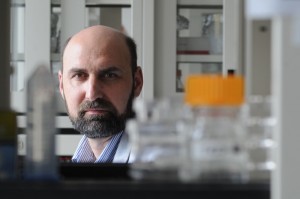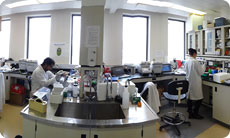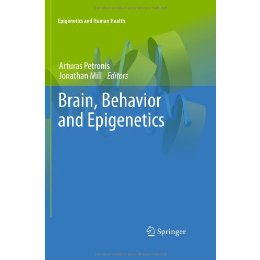 It has been generally accepted that evidence for inherited predisposition to a disease automatically implies involvement of DNA sequence variation (polymorphisms, mutations). Although this research program has been very productive in classical genetic disorders such as sickle cell anemia and Huntington’s disease, application of the DNA sequence-oriented paradigm to complex non-Mendelian diseases such as schizophrenia, asthma, diabetes, multiple sclerosis, among numerous others, has not led to significant breakthroughs thus far. Our laboratory has developed the epigenetic theory of complex disease which is based on two simple postulates: 1) (at least) some epigenetic factors (DNA and chromatin modification) are transmitted from one generation to another, along with the DNA sequences, and the former can account for heritability of (at least) some traits; ii) epigenetic factors play a critical role in the regulation of various genomic functions in the cell. The significant heuristic advantage is that putative epigenetic misregulation of genes, more so than DNA sequence-based ones, can explain a series of universal non-Mendelian features: i) environmental effects; ii) discordance of monozygotic twins; iii) differential susceptibility in males and females; iv) parental origin effects; v) in some complex diseases, fluctuating course and even recovery; vi) presence of familial and sporadic cases and unclear mode of inheritance.
It has been generally accepted that evidence for inherited predisposition to a disease automatically implies involvement of DNA sequence variation (polymorphisms, mutations). Although this research program has been very productive in classical genetic disorders such as sickle cell anemia and Huntington’s disease, application of the DNA sequence-oriented paradigm to complex non-Mendelian diseases such as schizophrenia, asthma, diabetes, multiple sclerosis, among numerous others, has not led to significant breakthroughs thus far. Our laboratory has developed the epigenetic theory of complex disease which is based on two simple postulates: 1) (at least) some epigenetic factors (DNA and chromatin modification) are transmitted from one generation to another, along with the DNA sequences, and the former can account for heritability of (at least) some traits; ii) epigenetic factors play a critical role in the regulation of various genomic functions in the cell. The significant heuristic advantage is that putative epigenetic misregulation of genes, more so than DNA sequence-based ones, can explain a series of universal non-Mendelian features: i) environmental effects; ii) discordance of monozygotic twins; iii) differential susceptibility in males and females; iv) parental origin effects; v) in some complex diseases, fluctuating course and even recovery; vi) presence of familial and sporadic cases and unclear mode of inheritance.
The recently opened Krembil Family Epigenetics Research Laboratory of the Centre for Addiction and Mental Health is fully dedicated to the understanding of the role of epigenetic risk factors in complex diseases. We use a spectrum of molecular techniques from single nucleotide modification analysis to a large scale, full chromosome microarray-based screening for epigenetic changes in affected individuals and controls. Research in psychiatric disorders is the main mandate of the laboratory but we are also interested in other non-Mendelian diseases such as diabetes and Crohn’s disease. It is expected that identification of epigenetic changes in human diseases will provide the basis for new, epigenetic modification-based therapeutic approaches.
| Dr. Arturas Petronis has published “Epigenetics as a unifying principle in the aetiology of complex traits and diseases” in the science journal Nature. |
Selected Publications:
Tolg C, Sabha N, Cortese R, Panchal T, Ahsan A, Soliman A, Aitken KJ, Petronis A, Bägli DJ. Uropathogenic E. coli infection provokes epigenetic downregulation of CDKN2A (p16INK4A) in uroepithelial cells. Lab Invest. 91(6):825-36; 2011.
Kaminsky Z, Tochigi M, Jia P, Pal M, Mill J, Kwan A, Ioshikhes I, Vincent JB, Kennedy JL, Strauss J, Pai S, Wang SC, Petronis A. A multi-tissue analysis identifies HLA complex group 9 gene methylation differences in bipolar disorder. Mol Psychiatry. 2011 Jun 7. [Epub ahead of print]
Vedadi M, Barsyte-Lovejoy D, Liu F, Rival-Gervier S, Allali-Hassani A, Labrie V, Wigle TJ, Dimaggio PA, Wasney GA, Siarheyeva A, Dong A, Tempel W, Wang SC, Chen X, Chau I, Mangano TJ, Huang XP, Simpson CD, Pattenden SG, Norris JL, Kireev DB, Tripathy A, Edwards A, Roth BL, Janzen WP, Garcia BA, Petronis A, Ellis J, Brown PJ, Frye SV, Arrowsmith CH, Jin J. A chemical probe selectively inhibits G9a and GLP methyltransferase activity in cells. Nat Chem Biol. 2011 Jul 10;7(8):566-74.
Petronis A, Mill J (eds). Brain, Behavior and Epigenetics. Series: Epigenetics and Human Health. Springer, 2011; 317p.
Ptak C, Petronis A. Epigenetic approaches to psychiatric disease. Dialogues Clin Neurosci. 2010; 12(1):25-35.
Petronis A. Epigenetics as a unifying principle in etiology of complex diseases and traits. Nature, 465(7299):721-7; 2010.
Flanagan JM, Munoz-Alegre M, Henderson S, Tang T, Sun P, Johnson N, Fletcher O, Santos Silva I, Peto J, Boshoff C, Narod S, Petronis A. Gene body hypermethylation of ATM in peripheral blood DNA of bilateral breast cancer patients. Human Mol Gen. 2009; 18(7):1332-42.
Kaminsky ZA, Tang T, Wang SC, Ptak C, Oh G, Wong AHC, Feldcamp LA, Virtanen C, Halfvarson J, Tysk C, McRae AF, Visscher PM, Montgomery GW, Gottesman II, Martin NG, Petronis A. DNA Methylation Profiles in Monozygotic and Dizygotic Twins. Nature Genetics, 2009; 41(2):240-5.
Kaminsky Z, Petronis A. Methylation SNaPshot: A Method for the Quantification of Site-Specific DNA Methylation Levels. Methods Mol Biol. 2009; 507:241-55.
Wang SC, Petronis A. DNA Methylation Microarrays: Experimental Design and Statistical Analysis. Taylor & Francis, USA, 2008.
Ptak C, Petronis A. Epigenetics and complex disease: from etiology to new therapeutics. Ann Rev Pharmacol and Toxicol. 2008; 48: 48:257-76.
Mill J, Tang T, Kaminsky ZA, Khare T, Yazdanpanah S, Bouchard L, Assadzadeh A, Flanagan J, Schumacher A, Wang S-C, Petronis A. Epigenomic Profiling Reveals DNA Methylation Changes Associated with Major Psychosis. Am J Hum Genet. 2008 Mar; 82(3):696-711.
Oh G, Petronis A. Environmental studies of schizophrenia through the prism of epigenetics. Schizophr Bull. 2008; 34(6):1122-9.
Mill J, Petronis A. Molecular studies of major depressive disorder: the epigenetic perspective. Mol Psychiat. 2007; 12(9): 799-814.
Schumacher A, Kapranov P, Kaminsky ZA, Flanagan J, Assadzadeh A, Yau P, Virtanen C, Winegarden N, Cheng J, Gingeras T, Petronis A. Microarray-based DNA Methylation Profiling: Technology and Applications. Nucleic Acid Res. 2006; 34(2):528-42.
Petronis A. Epigenetics and Twins: Three Variations on the Theme. Trends in Genetics, 2006; 22(7):347-50.
Flanagan J, Popendikyte V, Pozdniakovaite N, Sobolev M, Assadzadeh A, Schumacher A, Zangeneh M, Lau L, Virtanen C, Wang S-C, and Petronis A. Intra- and Inter- Individual Epigenetic Variation in Human Germ Cells. Am J Hum Gen. 2006; 79(1): 67-84.
Wong AH, Gottesman II, Petronis A. Phenotypic differences in genetically identical organisms: the epigenetic perspective. Hum Mol Gen. 2005; 14 Suppl 1:R11-8.
Kaminsky ZA, Assadzadeh A, Flanagan J, and Petronis A. Single Nucleotide Extension Technology for Quantitative Site Specific Evaluation of metC/C in GC-Rich Regions.Nucleic Acid Res. 2005; 33(10): e95.





